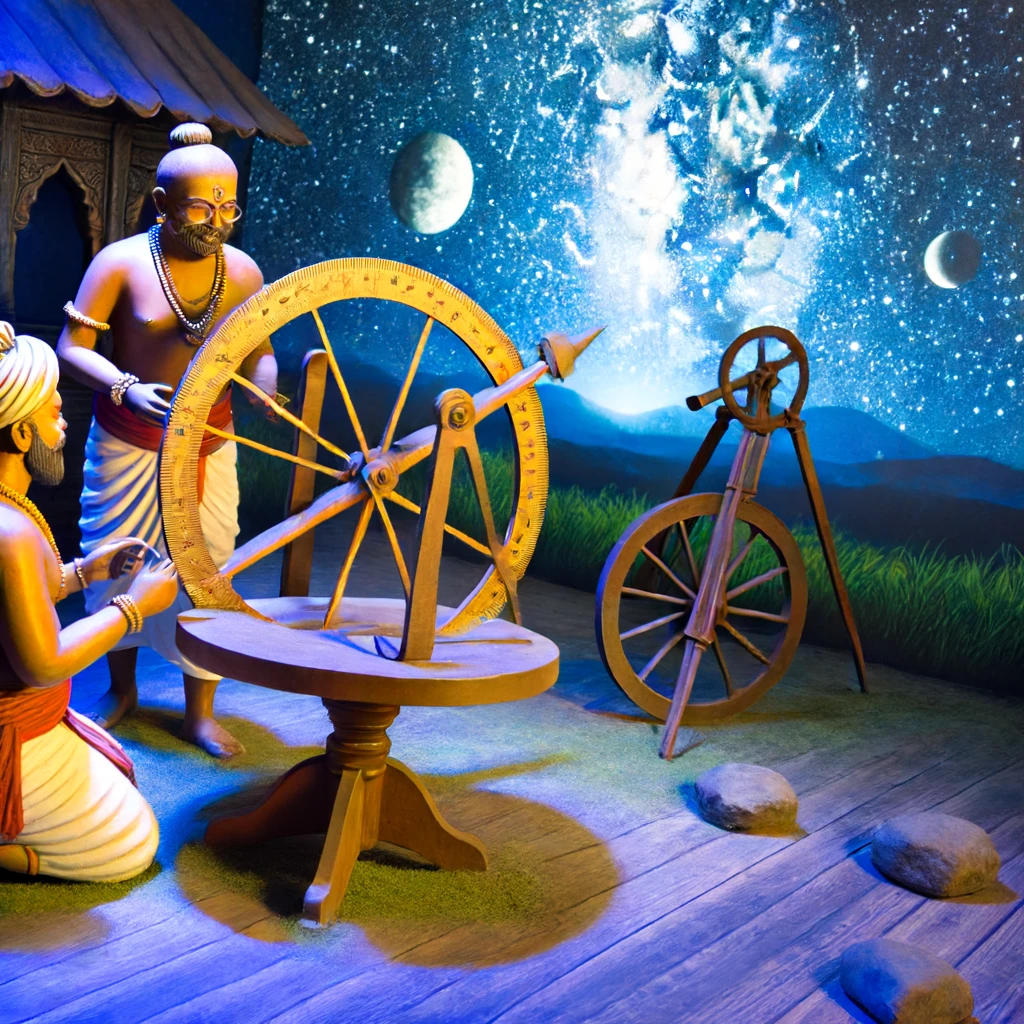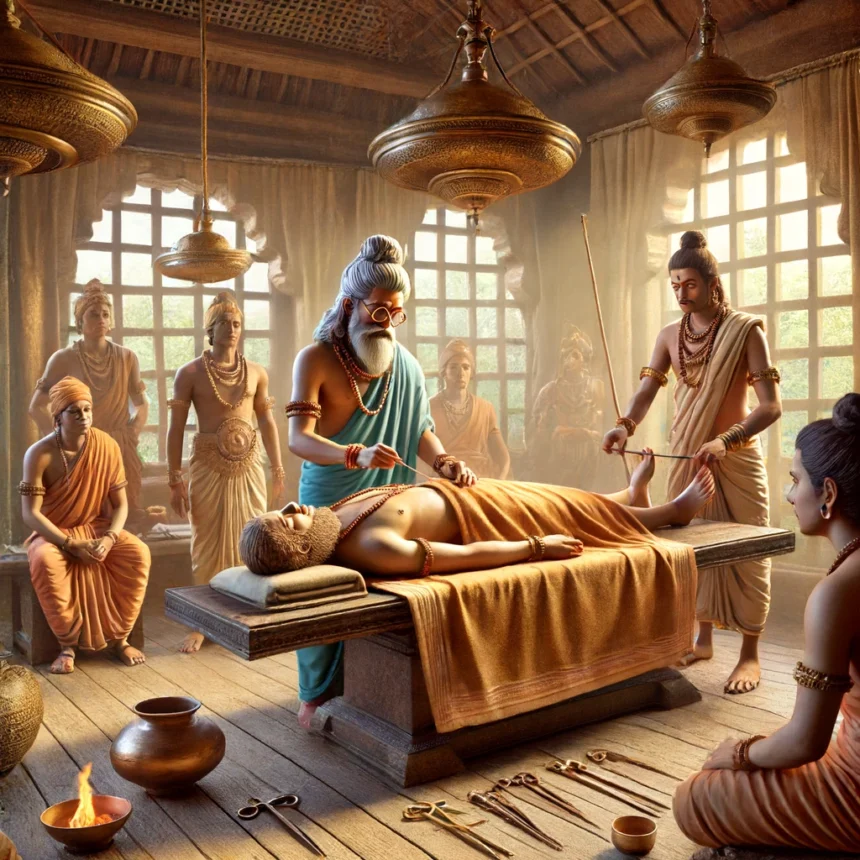Ancient Science Hub: And Vedic Wisdom
India as Ancient Science Hub
In the upcoming post for HinduInfoPedia.org’s Sunday series “Reflections and Personal Insights,” we will explore how India is redefining its role as a Science Hub. Scheduled for June 16, 2024, this entry delves into India’s strategic melding of its rich Vedic heritage with modern scientific breakthroughs. Historically a bedrock of Vedic knowledge, India is today leveraging this wisdom to spearhead innovations and reclaim its status as a global Science Hub. This blog will highlight how the fusion of ancient and contemporary sciences is propelling India back to the forefront of global scientific leadership.
The Legacy of Ancient India as a Pioneering Science Hub
In the annals of history, ancient India emerges not just as a cradle of civilization but as a formidable nexus of scientific and intellectual endeavor. Esteemed centers of learning such as Nalanda and Takshashila transcended the traditional boundaries of educational institutions, evolving into dynamic science hubs. These establishments attracted scholars from across the world, fostering a vibrant exchange of ideas in mathematics, astronomy, medicine, and numerous other disciplines. It was in these hallowed halls that seminal theories in algebra and calculus were conceptualized, and pioneering studies in botany and environmental science were undertaken, leaving an indelible mark on various global civilizations.
Vedic Contributions to Astronomy and Mathematics
Astronomy, revered as one of the six Vedangas—essential branches of Vedic knowledge—illustrates ancient India’s deep engagement with cosmic phenomena. Visionary scholars like Aryabhata and Brahmagupta, whose insights into celestial mechanics predated many Western theories, laid the foundational stones of what would become a rich tradition of Indian astronomy. Aryabhata’s groundbreaking calculation of pi (π) and his estimates of Earth’s circumference in the 5th century highlight a remarkable grasp of mathematical and astronomical concepts, which have been recorded in meticulous detail in Vedic literature.
Ayurveda: Ancient India’s Enduring Legacy in Medicine
Ayurveda, the venerable ‘science of life,’ embodies the ancient holistic approach to health and wellness practiced in India. As detailed in seminal texts like the Charaka Samhita, this traditional medical system combines botanical knowledge, anatomical study, and pharmacological expertise with surgical practices. Such a comprehensive medical framework not only catered to physical ailments but also emphasized the balance of mind, body, and spirit, illustrating the advanced medical understanding present in ancient India.
By delving deeper into these areas, we not only pay homage to the intellectual giants of ancient India but also reaffirm the global significance of its scholarly contributions. This rich legacy of knowledge and discovery positions ancient India as a true pioneer in the quest for scientific understanding, a legacy that continues to inspire and influence myriad scientific fields around the world.
Revival in Modern Era: India as an Emerging Science and Technology Powerhouse
Over the past few decades, India has re-emerged as a formidable force in the global science and technology arena. Initiatives like the Digital India campaign and significant investments in sectors such as information technology and biotechnology have marked India’s renewed commitment to reclaiming its historic role as a global science hub. This resurgence is not only revitalizing its ancient scientific legacy but also setting the stage for leading innovations in the modern world.
Space Exploration and Computer Science

At the forefront of India’s scientific renaissance is the Indian Space Research Organization (ISRO), which has gained international acclaim for its cost-effective and successful space missions, including the Mars Orbiter Mission. This achievement not only underscores India’s capabilities in space technology but also demonstrates its strategic use of limited resources to compete on a global scale. Similarly, India’s prowess in computer science and information technology is globally recognized, with Indian IT firms and professionals leading major projects and innovations worldwide. This sector continues to be a major contributor to India’s economic growth and international reputation as a technology leader.
Environmental Science and Green Chemistry
Parallel to technological advancements, India is making significant strides in environmental science and the development of sustainable practices. Embracing the concept of green chemistry, which aligns with the ancient Vedic principles of living in harmony with nature, India is advancing the development of renewable energy technologies and sustainable manufacturing processes. These efforts are crucial in addressing global environmental challenges and demonstrate how ancient wisdom can inform modern sustainable practices.
Bridging Ancient Wisdom and Modern Innovation: Vedic Principles in Contemporary Science and Technology
In recent times, the profound knowledge encapsulated in Vedic texts is finding new applications in contemporary scientific fields. For instance, principles from Ayurveda are being explored in modern holistic health practices, integrating traditional herbal treatments with current medical research. Similarly, Vedic mathematics, with its emphasis on mental calculation and algorithmic efficiency, is influencing modern computational methods and software development, showcasing the timeless relevance of these ancient systems.
As India strides forward on its path to becoming a global science hub, the influence of Vedic principles is increasingly evident in several cutting-edge scientific fields. By weaving ancient wisdom into modern research and development, India is not only honoring its rich cultural heritage but also enhancing the depth and sustainability of its scientific endeavors.
Vedic Science in Materials Science and Sustainable Architecture
One of the most promising areas where Vedic principles are being integrated into modern science is materials science. Researchers are revisiting ancient texts that discuss materials with unique properties, such as the purportedly indestructible ‘Vajra,’ to inspire new studies in composite materials and metallurgy. This has led to the development of innovative, more sustainable materials that are lighter, stronger, and more adaptable to India’s diverse environmental conditions.
In the realm of architecture, the concept of ‘Vastu Shastra’—an ancient Indian system of architecture and building that focuses on harmonious balance with natural forces—is experiencing a revival. Modern sustainable architecture in India increasingly incorporates Vastu principles to enhance energy efficiency and environmental integration. This approach not only improves the ecological footprint of buildings but also ensures that they are in tune with the cultural and spiritual dimensions of the space.
Institutional Integration of Vedic Science
Several Indian institutions have begun formal programs to study and integrate Vedic sciences with contemporary scientific research. For instance, the Indian Institute of Technology (IIT) Kharagpur has launched an initiative that explores the scientific aspects of the Vedas, including studies on consciousness and quantum physics in the context of Vedic literature. This program aims to uncover and validate ancient scientific knowledge through rigorous modern research methodologies.
Moreover, the government-supported AYUSH ministry, which focuses on traditional and non-conventional health practices including Ayurveda, Yoga, and Naturopathy, actively promotes research that integrates these ancient health sciences with modern medical research. This initiative has led to several breakthroughs in herbal medicine and holistic health practices, proving the efficacy of ancient wisdom in curing modern diseases.
Challenges and Future Prospects
Integrating ancient Vedic knowledge into modern scientific research is not without challenges. The primary hurdle is the translation and interpretation of ancient texts, which requires a deep understanding of Sanskrit and the contextual nuances of the time. Additionally, there is a need for a systematic approach to validate and standardize ancient practices and theories with contemporary scientific methods.
Despite these challenges, the future looks promising. As more institutions embrace the integration of Vedic knowledge into scientific curricula and research, we can expect a surge in innovations that are not only technologically advanced but also sustainable and deeply rooted in the ethical and holistic principles of Vedic science. This unique blend of the old and the new sets India on a path to not just lead in specific scientific domains but to redefine the global scientific paradigm to include ancient wisdom in solving contemporary issues.
By expanding research and development into these areas, India not only leverages its historical strengths but also provides a model for the global scientific community, showcasing how ancient principles can provide insights into and solutions for modern challenges. This ongoing synthesis of the ancient and the modern underlines India’s role as a dynamic and innovative science hub on the world stage.
Challenges and Opportunities: Vedic Science Vs Modern Science
Despite these advancements, integrating the profound wisdom found in Vedic texts with contemporary scientific research presents unique challenges and opportunities. The cosmological insights, physical theories, and biological knowledge preserved in these ancient texts offer untapped potential for modern scientific fields. By exploring these concepts, Indian researchers can unlock innovative approaches and solutions grounded in centuries-old knowledge.
Neuroscience and Meditation
One area where ancient Vedic knowledge has found resonance with modern science is in the study of neuroscience and meditation. Research into the neurological impacts of meditation practices, which were detailed in ancient scriptures, has begun to reveal the substantial health benefits these practices offer, supporting claims made in the Vedic texts. This integration of traditional practices with modern scientific research not only validates ancient wisdom but also enhances contemporary healthcare methodologies.
Sustainability and Vedic Environmental Principles
In terms of environmental conservation, the Vedic principle of living in harmony with nature is more relevant today than ever. Modern environmental science is increasingly drawing from these age-old teachings to develop technologies and practices that minimize human impact on the environment, promoting a sustainable model of development that can lead to more resilient ecological systems.
The Path Forward
As India continues to advance as a science hub, the fusion of ancient wisdom and modern science not only enriches its own cultural heritage but also contributes to global knowledge. This blend of tradition and innovation is crucial for developing holistic solutions to contemporary challenges, making India not only a follower but a leader in the global scientific community.
India’s journey from an ancient science hub to a modern innovator is a compelling narrative of revival, resilience, and reinvention. Embracing its Vedic roots while forging new frontiers in science and technology, India stands as a unique example of how ancient wisdom can inform and elevate modern scientific pursuits. As the world looks increasingly to sustainable and integrated solutions, India’s blend of history and innovation will undoubtedly play a pivotal role in shaping the future of global science.
Feature Image: Click here to view the image.
#VedicScience #IndianInnovation #GlobalScienceHub #AncientWisdom #ModernTechnology



Leave a Reply